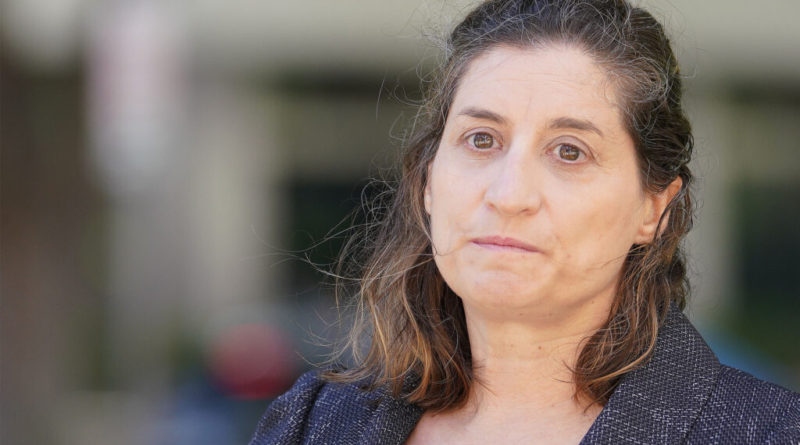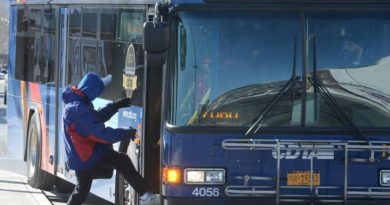This Whistleblower Exposed The Health Department’s COVID-19…
As the spread of COVID-19 spiraled out of control over the last week on Oahu, a story emerged about mismanagement at the Hawaii Department of Health. Despite previous assurances, Gov. David Ige on Thursday acknowledged that the department hadn’t hired enough disease investigators to contain the virus.
On Friday, the state epidemiologist responsible for blowing the whistle on the department’s failure came forward to tell her story, standing with a U.S. congressional representative and a prominent medical doctor at the forefront of the fight against the virus.
Jennifer Smith, a doctor of virology and an epidemiological specialist with the state Department of Health, explained how she and her colleagues, commonly called contact tracers, were so understaffed that she felt she had to begin looking outside the department for help.

Department of Health virologist Jennifer Smith exposed the shortage of contact tracers within the department.
Cory Lum/Civil Beat
By last week, state lawmakers were calling Dr. Sarah Park, the state epidemiologist, to testify, and they later stormed the Department of Health offices to fact check whether there were really as many contact tracers as Park claimed. Never slow to engage on public health issues as a leader in the state’s COVID-19 response, Lt. Gov. Josh Green, who is a medical doctor, also weighed in.
On Thursday, Ige announced changes meant to solve the problems, including a vow to bring on board more contact tracers and the removal of Park from her previous role overseeing the investigators.
None of that would have happened if not for Smith, U.S. Rep. Tulsi Gabbard said during a press conference outside the federal courthouse in Honolulu.
“We wouldn’t be standing here today without Dr. Smith,” Gabbard said.

U.S. Rep. Tulsi Gabbard said she will have news next week of a congressional inquiry into Hawaii Health Department matters.
Cory Lum/Civil Beat
Dr. Scott Miscovich, who has been leading efforts to bolster Hawaii’s testing response, agreed.
“She’s the catalyst,” Miscovich said. He added that Smith had shared with policymakers not just her observations but also documentation showing the number of active contact tracers and their case loads.
Janice Okubo, a department spokeswoman, declined to say whether Smith had helped prompt the changes, citing the confidentiality of personnel matters. Instead, Okubo reiterated the bulk of a statement from the day before, when Ige promised to do better.
“The Department of Health is acutely aware of the important role of disease investigation in fighting this pandemic,” the DOH statement said. “We have brought on additional staffing and resources and are working to further expand and realign the work of our disease investigation staff. We have expedited the redeployment of DOH staff from other programs, established teams of National Guard personnel, and continue to work with the University of Hawaii, Medical Reserve Corps and other entities to recruit skilled and knowledgeable workers.
“The work of our entire public health staff is a testament to the enduring commitment the department has to Hawaii,” the statement added.
Okubo declined to comment on a number of specific statements made by Smith and Gabbard.
Although technically known as a disease investigator, Smith’s duties include interviewing people who have tested positive for the disease then tracking down all their close contacts, defined as people who had been within six feet of the infected person for at least 15 minutes in the previous two weeks.
The close contacts then theoretically can be tested to see if they have the virus, or, even if not tested at least stay isolated for two weeks while they see if they get sick.
The idea behind such contact tracing is that, if done quickly, it can contain the virus in clusters.
The problem was there weren’t nearly enough contact tracers to do it quickly, Smith said. By some estimates, an island the population of Oahu would need a few hundred contact tracers during a pandemic. In this case, Oahu had fewer than 10 actively working, Smith said.
This meant that the few on the job were overwhelmed as the virus spread.
Given the demands of cold calling and explaining bad news to as many as dozens of close contacts of an infected person, Smith said a manageable case load is about three cases at a time. But department staff had far more than that.
For example, she said, in a recent week as cases began to escalate, she started with 22 on a Tuesday, then had 47 on Wednesday and 59 on Friday. There was simply no way to reach that many people. With lives depending on her doing a job she simply could not do, Smith said she had a panic attack and had to leave work.
In the health department’s statement, the spokeswoman said the agency as of Friday has 100 active contact tracers and administrative staff on Oahu.
Case Surge Is Likely To Continue
Despite the challenges, Smith said she’s ready to continue. She said she expects the case count to rise before it falls.
“There’s more coming; this is not the end,” she said. “And we need to be ready when that happens.”
Asked if she was worried about retaliation for speaking out, she said she wasn’t.
“What more can they do to us?” she asked. “They beat us into the ground already.”
The press conference with Smith could have been a fitting denouement for the week’s dramatic events, but Gabbard said it will not stop there. She said Hawaii needs 560 contact tracers to deal with the widening crisis.
She said the mismanagement by Anderson and Park was so profound that Congress must step in to ensure the agency has properly spent some $50 million in federal money that was supposed to be used for testing and contact tracing.
She also criticized Ige for not holding Park and Anderson accountable.
“What will it take for our state leaders to actually fight for the people of Hawaii?” she asked.
Miscovich said the medical community was eager to step in and take over the effort. He said it could easily muster and train 560 contact tracers by the end of next week from the ranks of health care workers.




